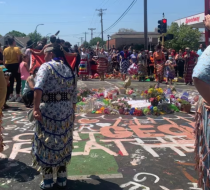Jingle dress dancers honour George Floyd at site where he was killed Favorite
Indigenous people in Minneapolis supporting Black Lives Matter cite similar struggles
Jingle dress dancers held a ceremony at the intersection of 38th Street and Chicago Avenue in Minneapolis on Monday, the place where George Floyd was killed by police last week.
Floyd, a black man, died after a white police officer pressed his knee into Floyd's neck for minutes, even after he stopped moving. The officer, Derek Chauvin, has been fired and charged with third-degree murder and second-degree manslaughter.
"The jingle dress dance is such a beautiful and powerful action to take… It has this deep spiritual meaning and power behind it," said Tara Houska, who attended the event.
Houska, Anishinaabekwe from Couchiching First Nation in Ontario, is a tribal attorney and community organizer with the Giniw Collective, a pipeline resistance group.
Houska said people from different cultures who were there to pay their respects to Floyd joined in to observe the ceremony.
"To see the women bringing that power and that connection to that space, I think it meant a lot to the community of all colours."
According to the U.S. Census Bureau, Minnesota is home to over 67,000 Indigenous people. Many in the region have stepped up to support the Black Lives Matter organizers in the city since protests began last week.
"We got called upon. We went and sang for Black Lives Matter at one protest on 29th and East Lake Street," said Joseph Mousseau.
Mousseau, Anishinaabe from Sandy Bay First Nation in Manitoba, is a powwow singer who has been working in Minneapolis at the Bdote Learning Center for the past year.
Mousseau said growing up in Canada, the Indigenous and black communities share experiences with police violence. He says it's one of the reasons why Indigenous people have been quick to support the cause.
"We're a minority in our continent," said Mousseau. "How the black people get treated down here [in America], the Natives get treated in Canada."
Iva Rasmusson is an Ojibway great-grandmother who grew up in Minneapolis and has lived in the city off and on since the 1960s. She said the relationship between the Indigenous community and the Minneapolis Police Department has long been strained.
"Our population has been discriminated against as well so we are supporting that community," said Rasmusson, the operations manager at Bdote Learning Center.
"We need to have healing in this community."
Another community organizer, Lisa Skjefte, Anishinaabekwe from the Red Lake Band in Minnesota, helped to get drum groups to participate in actions throughout the city.
"This kind of unity that's bringing people together, it's the kind of thing that's going to help us battle systems of oppression," said Skjefte.
She said that Indigenous people have a long history of resistance and that protests this week are an opportunity to have a better relationship with the black community moving forward.







